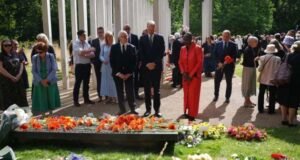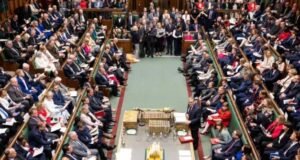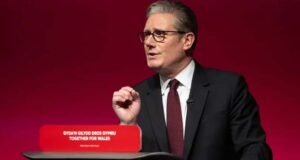
David Cameron’s revelation that he sought help from the Queen ahead of the Scottish independence vote in 2014 has caused displeasure at Buckingham Palace, a source has said.
The former PM told the BBC he had asked whether the Queen could “raise an eyebrow” about the prospect of Scotland voting for independence.
The Queen later said people should “think carefully about the future”.
Buckingham Palace has made no official comment on Mr Cameron’s remarks.
The revelation is made in a two-part BBC documentary in which the former PM reflects on his time in Downing Street.
What was discussed with the Queen’s officials was not “anything that would be in any way improper… but just a raising of the eyebrow even… a quarter of an inch”, he said.
The former Tory leader also discusses the Scottish referendum in his book, which he has been publicising this week.
A source told the BBC “it serves no-one’s interests” for conversations between the PM and the Queen to be made public .
“It makes it very hard for the relationship to thrive,” they added.
Asked about the response from the Palace, Mr Cameron told the BBC’s Jeremy Vine he had tried to give an “honest explanation” of his actions.
“I was trying to explain the frustrations there were when you had one side in the referendum saying we’re going to have a Queen of an independent Scotland and everybody is fine and dandy,” he added.
But he said he had “probably said as much or possibly too much” about his conversation with the monarch.
Scotland rejected independence by a margin of 55.3% to 44.7%, a result which Mr Cameron said left him “blissfully happy”.
In a statement, Alex Salmond, who resigned as Scotland’s first minister in the wake of the result, said Mr Cameron’s actions were not only improper, but showed how desperate the No side was during the final stages of the independence campaign.
At First Minister’s Questions in Holyrood, Nicola Sturgeon was asked whether she was concerned about the Queen being asked to interfere in a potential second independence referendum.
“I think the revelations – if I can call them that – from David Cameron say more about him than they do about anybody else, and really demonstrate the panic that was in the heart of the UK government in the run-up to the independence referendum five years ago,” she said.
Just as the first rule of Fight Club is that you do not talk about Fight Club, the first rule of the relationship between the prime minister and the Queen is that you never, ever talk about the relationship between the PM and the Queen.
A Buckingham Palace source told the BBC that there was an amount of displeasure at David Cameron’s comments.
You can probably read that as cold fury. Not just because he has broken the first rule. But because he has made it painfully clear that in 2014 he used the Queen for his own political purposes. And that she and her advisors thought that was OK.
The revelation comes as her suspension of Parliament – a suspension made on the effective instruction of Boris Johnson – comes under unprecedented scrutiny in the Supreme Court.
The two cases are very different, but they both highlight the dark greys of the Queen’s constitutional position, the discretion she has or lacks, under extraordinary circumstances, to speak out and act.
 Weekly Bangla Mirror | Bangla Mirror, Bangladeshi news in UK, bangla mirror news
Weekly Bangla Mirror | Bangla Mirror, Bangladeshi news in UK, bangla mirror news







